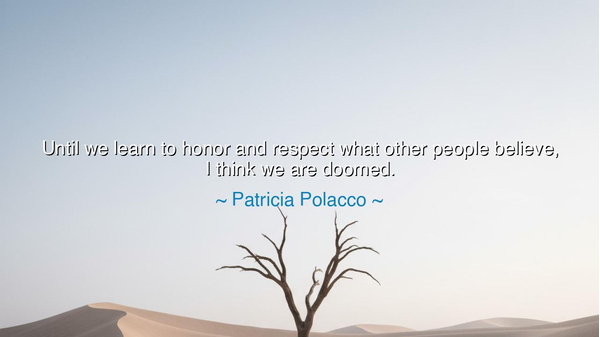
Until we learn to honor and respect what other people believe, I






When Patricia Polacco declared, “Until we learn to honor and respect what other people believe, I think we are doomed,” she spoke not merely as an artist or storyteller, but as a keeper of human memory. Her words resound like the voice of an elder beneath an ancient tree, warning those who will inherit the earth that the fate of civilization depends not on conquest or invention, but on understanding. She calls us to awaken from the slumber of arrogance, to recognize that beliefs, though diverse and often conflicting, are sacred reflections of the human soul. Her tone is both mournful and resolute — for she has seen how division consumes nations and hearts alike, and how only respect can rebuild what hatred destroys.
To honor and respect the beliefs of others is not to surrender one’s own convictions; it is to acknowledge that truth wears many faces and speaks in many tongues. The ancients understood this well. The philosophers of Greece, the sages of India, the prophets of the desert — all knew that wisdom begins not with certainty, but with humility. Polacco’s warning is timeless: when people cease to listen, when they mock or fear what they do not understand, the threads of human fellowship begin to unravel. And when those threads are lost, what remains is chaos — the ruin of empathy, the end of peace. In this way, her words are less prophecy than reflection, for every age that has forgotten respect has soon learned destruction.
The origin of her insight springs from her life’s own fabric. Patricia Polacco, a writer and illustrator beloved by children, has long used her stories to teach compassion, cultural understanding, and the healing power of dialogue. Born into a family rich in diverse traditions — Russian, Ukrainian, Jewish, Irish — she grew up listening to stories from many faiths and many lands. Her grandmother’s tales of courage and kindness shaped her, teaching her that difference is not danger, but beauty. In her books, she portrays children who learn to embrace what is unfamiliar, to see humanity in every face. Thus, her quote is not theory, but lived truth: she has seen how respect can turn strangers into friends and how its absence can turn neighbors into enemies.
History bears grim witness to the doom she fears. Consider the story of the Crusades, when Europe and the Middle East, both guided by faith, met not in dialogue but in bloodshed. Each side believed its truth to be eternal and exclusive, and in that certainty, countless lives were lost. Or remember the Holocaust, when one nation’s hatred of difference brought the world to its knees. These tragedies were not caused by evil alone, but by the inability to honor what others believed, to see humanity in those who prayed differently, spoke differently, or looked differently. The ancients would have called this folly hubris — the arrogance that blinds the heart and invites ruin. And it is this blindness that Polacco warns will doom us again if we do not learn humility.
Yet her words are not merely lamentation — they are a call to action, a moral summons to rebuild the bridges of understanding. To honor others’ beliefs does not mean to agree with them, but to see them through the lens of curiosity rather than judgment. It means to speak less and listen more, to ask not “How can I prove them wrong?” but “What truth do they see that I do not?” The ancient philosophers taught that dialogue — logos — is the highest art of civilization. For in dialogue, the soul learns patience, empathy, and the beauty of difference. Every person you meet carries a fragment of wisdom that you do not possess; to dismiss their belief is to deny yourself that wisdom.
There is a story from the life of Mahatma Gandhi that reflects this truth. During India’s struggle for independence, violence often erupted between Hindus and Muslims. Gandhi, himself a devout Hindu, would walk barefoot into the midst of riots, speaking to both sides, urging them to see not enemies, but brothers. He fasted until men laid down their weapons. His message was simple: that respect for the beliefs of others is not weakness, but strength — the strength to recognize the divine spark in all beings. Gandhi understood, as Polacco does, that peace is not achieved by dominance, but by reverence — the reverence that listens, learns, and loves despite difference.
Thus, the lesson of Patricia Polacco’s words is this: humanity survives only through respect. Every war, every injustice, every cruelty begins with a failure to understand another’s belief. To reverse this, we must practice daily acts of listening and compassion. In our homes, let us teach children that difference is not threat but treasure. In our communities, let us speak with those we disagree with, not to win but to learn. In our nations, let leaders govern not through division, but through empathy. For the ancients taught that the world stands on three pillars — truth, justice, and peace — and all three crumble when respect is forgotten.
And so, let her words be carried forward as a torch for our time: “Until we learn to honor and respect what other people believe, we are doomed.” This is not a curse, but a choice. The power to avert doom lies not in armies or laws, but in the quiet courage of the heart — the courage to listen, to love, and to learn from one another. For when respect reigns, peace blooms; and when peace blooms, humanity rises again, reborn from the ashes of its ignorance, to stand once more beneath the shared sky of understanding.






AAdministratorAdministrator
Welcome, honored guests. Please leave a comment, we will respond soon